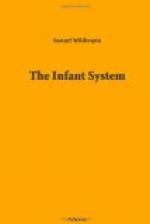ALE AND BEER MEASURE.
Two pints will make one quart,
Four quarts one gallon, strong:—
Some drink but little, some too much,—
To drink too much is wrong.
Eight gallons one firkin make,
Of liquor that’s call’d
ale
Nine gallons one firkin of beer,
Whether ’tis mild or
stale.
With gallons fifty-four
A hogshead I can fill:
But hope I never shall drink much,
Drink much whoever will.
WINE, OIL, AND SPIRIT MEASURE.
Two pints will make one quart
Of any wine, I’m told:
Four quarts one gallon are of port
Or claret, new or old.
Forty-two gallons will
A tierce fill to the bung:
And sixty-three’s a hogshead full
Of brandy, oil, or rum.
Eighty-four gallons make
One puncheon fill’d
to brim,
Two hogsheads make one pipe or butt,
Two pipes will make one tun.
A little wine within
Oft cheers the mind that’s
sad;
But too much brandy, rum, or gin,
No doubt is very bad.
From all excess beware,
Which sorrow must attend;
Drunkards a life of woe must share,—
When time with them shall
end.
The arithmeticon, I would just remark, may be applied to geometry. Round, square, oblong, &c. &c., may be easily taught. It may also be used in teaching geography. The shape of the earth may be shewn by a ball, the surface by the outside, its revolution on its axis by turning it round, and the idea of day and night may be given by a ball and a candle in a dark-room.
As the construction and application of this instrument is the result of personal, long-continued, and anxious effort, and as I have rarely seen a pirated one made properly or understood, I may express a hope that whenever it is wanted either for schools or nurseries, application will be made for it to my depot.
I have only to add, that a board is placed at the back to keep the children from seeing the balls, except as they are put out; and that the brass figures at the side are intended to assist the master when he is called away, so that he may see, on returning to the frame, where he left off.
The slightest glance at the wood-cut will shew how unjust the observations of the writer of “Schools for the Industrious Classes, or the Present State of Education amongst the Working People of England,” published under the superintendance of the Central Society of Education, are, where he says, “We are willing to assume that Mr. Wilderspin has originated some improvements in the system of Infant School education; but Mr. Wilderspin claims so much that many persons have been led to refuse him that degree of credit to which he is fairly entitled. For example, he claims a beneficial interest in an instrument called the Arithmeticon, of which he says he was the inventor.




